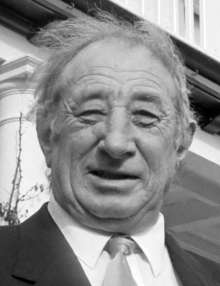Barry Crump
Barry Crump MBE (15 May 1935 – 3 July 1996) was a New Zealand author of semi-autobiographical comic novels based on his image as a rugged outdoors man. Taken together his novels have sold more than a million copies domestically, equating to one book sold for every five New Zealanders. Crump's 1986 work Wild Pork and Watercress was adapted into the 2016 Taika Waititi film Hunt for the Wilderpeople.
Barry Crump MBE | |
|---|---|
 Barry Crump in 1994 | |
| Born | John Barrie Crump 15 May 1935 Papatoetoe, Auckland, New Zealand |
| Died | 3 July 1996 (aged 61) |
| Occupation | Novelist |
Biography
Born John Barrie Crump in Papatoetoe, Auckland, Crump worked for many years as a government deer-culler in areas of New Zealand native forest (termed "the bush"). He wrote his first novel, A Good Keen Man, in 1960, based on his experiences as a government hunter. It was a fictional account of a young hunter who has to suffer through a series of hunting partners who are often unsuitable for the job. This novel became one of the most popular in New Zealand history, and Crump's success continued with Hang on a Minute Mate (1961), One of Us (1962), There and Back (1963), Gulf (1964), A Good Keen Girl (1970), Bastards I Have Met (1971), and others, which capitalized on the appeal of his good-natured itinerant self-sufficient characters and an idiomatic "blokey" writing style that he developed after his first book.
Crump travelled throughout Australia (where he hunted crocodiles), Europe, Turkey, and India, the result of which was his conversion to the Baháʼí Faith by 1982.[1] He married five times, including a one-year marriage to the poet Fleur Adcock, a ten-year marriage to Jean Watson and a twelve-year marriage to Robin Lee-Robinson. He had six sons,[2][3] one of them with photographer Ans Westra.[4] In 1988 Crump nearly died from accidentally inhaling cyanide when trapping possums.[5] One of his sons, Martin Crump is now a well-known radio broadcaster.[6] Towards the end of his life his literary style changed as he wrote children's stories featuring characters he created; vis the Pungapeople.
Crump was also well known for appearing in a series of acclaimed New Zealand television advertisements for Toyota's four-wheel drive cars, which relied on his image as a stalwart "bushman". The ads aired between 1982 and 1995. He played an archetypal Kiwi bloke in the 1964 New Zealand film Runaway.
Crump's song, "Side By Side", featuring his "sidekick" Scotty (broadcaster Lloyd Scott), was used as the theme song for Team New Zealand in the America's Cup. Crump was awarded the New Zealand 1990 Commemoration Medal in 1990,[7] and was appointed a Member of the Order of the British Empire in the 1994 New Year Honours, for services to literature and the community.[8]
Crump died in 1996 of a suspected aortic aneurism. At the time of his death he was living at Ohauiti with his wife Maggie.[9]
Bibliography
- A Good Keen Man (1960)
- Hang on a Minute Mate (1961)
- One of Us (1962)
- There and Back (1963)
- Gulf (1964)
- Scrapwagon (1965)
- The Odd Spot of Bother (1967)
- No Reference Intended (1968)
- Warm Beer (1969)
- A Good Keen Girl (1970)
- Bastards I Have Met (1971)
- Fred (1972)
- Shorty (1980)
- Puha Road (1982)
- The Adventures of Sam Cash (1985)
- Wild Pork and Watercress (1986); Filmed by Taika Waititi as Hunt for the Wilderpeople
- Bedtime Yarns (1988)
- Bullock Creek (1989)
- The Life and Times of a Good Keen Man (1992) (autobiography part 1)
- Gold and Greenstone (1993)
- Arty and the Fox (1994)
- Forty Yarns and a Song (1995) (autobiography part 2)
- Mrs Windyflax and the Pungapeople (1995)
- Crumpy's Campfire Companion (1996) (autobiography part 3)
- As The Saying Goes (1996)
- Song of a Drifter (1996)
- Back Down The Track (1998)
- The Pungapeople of Ninety Mile Beach (1999)
- Harry Hobnail and the Pungapeople (2002)
- Mr Tanglewood and the Pungapeople (2005)
- Professor Pingwit and the Pungapeople (2009)
Books Relating to Barry Crump
A Tribute To Crumpy; Barry Crump 1935–1996, Various Authors (1996).
The Old Dynamite Shack, by George Johnston, (1999).
A Life in Loose Strides; The Story of Barry Crump, by Colin Hogg, (2000).
The Hermit of Cemetery Island, by George Johnston, (2002).
In Endless Fear; A True Story, by Colin Crump, (2002).
In Salting the Gravy; A Tale of a Twelve Year Marriage to Barry Crump, by Robin Lee-Robinson, (2004).
References
- Tony Reid (20 November 1982). "'Crump Flags It Away'—Profile of Barry Crump, a New Zealand Bahaʼi". New Zealand Listener. Wellington, N. Z.: 21–22, 25, 26.
- "Barry Crump's good keen family". Close Up / Stuff.co.nz. 28 October 2009. Retrieved 19 February 2012.
- "About Barry". barrycrump.com. Archived from the original on 17 September 2011. Retrieved 19 February 2012.
- Zander, Bianca (18 March 2005). "The eye of Ans Westra". New Zealand Listener. Retrieved 30 November 2019 – via Noted.
- Lee-Robinson, Robin (2004). In Salting the Gravy: A Tale of a 12 Year Marriage to Barry Crump. Robin Lee-Robinson. p. 201. ISBN 0476002443.
- "Crump, Martin". New Zealand Book Council. Retrieved 27 July 2010.
- Taylor, Alister; Coddington, Deborah (1994). Honoured by the Queen – New Zealand. Auckland: New Zealand Who's Who Aotearoa. p. 112. ISBN 0-908578-34-2.
- "No. 53528". The London Gazette (2nd supplement). 31 December 1993. p. 34.
- NZPA (5 July 1996). "Crump still had goals - wife". The Press.
External links
- Official website
- "Crump, Barry" in the Dictionary of New Zealand Biography
- Barry Crump at New Zealand Book Council / Oxford Companion to New Zealand Literature